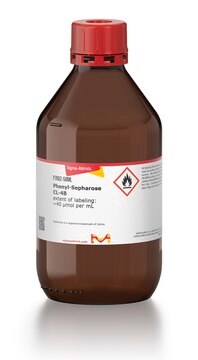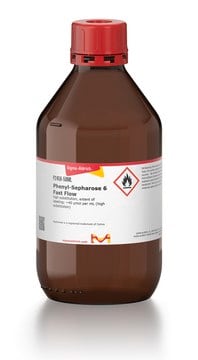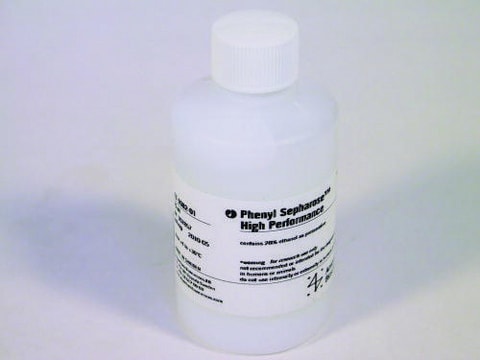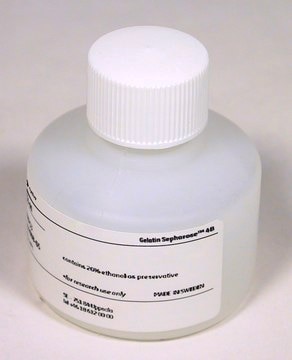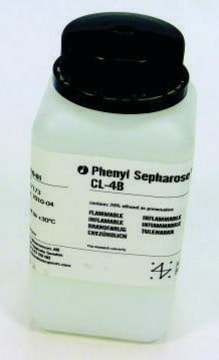CL4B200
Sepharose™ CL-4B Size Exclusion Resin
Cross-linked, 90-350 mesh
About This Item
Recommended Products
product name
Sepharose™ CL-4B, Cross-linked
Quality Level
form
beads
technique(s)
LPLC: suitable
matrix
Agarose
matrix active group
polymer
bead diameter
40-165 μm
pore size
30,000-5,000,000 fractionation range (Dextrans)
60,000-20,000,000 fractionation range (Globular proteins)
separation technique
size exclusion (SEC)
storage temp.
2-8°C
Looking for similar products? Visit Product Comparison Guide
General description
Application
- Molecular size distribution assessment of Haemophilus influenzae vaccine containing lactose by HPAEC-PAD and colorimetric assays: This study used Sepharose CL-4B in a methodology assessing molecular size distribution in vaccine formulations, indicating its application in quality control and development processes in vaccine production (Nadim AH et al., 2022).
- Camel hydatidosis diagnostic kit: optimization of turnip and horseradish peroxidase conjugates using glutaraldehyde method: This research mentions the use of Sepharose CL-4B in the development of diagnostic kits, suggesting its role in enhancing diagnostic assay development through effective enzyme conjugation techniques (Kandil OM et al., 2020).
- Pectin from leaves of birch (Betula pendula Roth.): Results of NMR experiments and hypothesis of the RG-I structure: Sepharose CL-4B was utilized in the structural elucidation of pectins from birch leaves, underscoring its importance in the structural study of polysaccharides which is essential for understanding their biological functions and industrial applications (Golovchenko VV et al., 2022).
Legal Information
related product
replaced by
Signal Word
Warning
Hazard Statements
Precautionary Statements
Hazard Classifications
Flam. Liq. 3
Storage Class Code
3 - Flammable liquids
WGK
WGK 1
Flash Point(F)
100.4 - 109.4 °F
Flash Point(C)
38 - 43 °C
Certificates of Analysis (COA)
Search for Certificates of Analysis (COA) by entering the products Lot/Batch Number. Lot and Batch Numbers can be found on a product’s label following the words ‘Lot’ or ‘Batch’.
Already Own This Product?
Find documentation for the products that you have recently purchased in the Document Library.
Customers Also Viewed
Our team of scientists has experience in all areas of research including Life Science, Material Science, Chemical Synthesis, Chromatography, Analytical and many others.
Contact Technical Service


